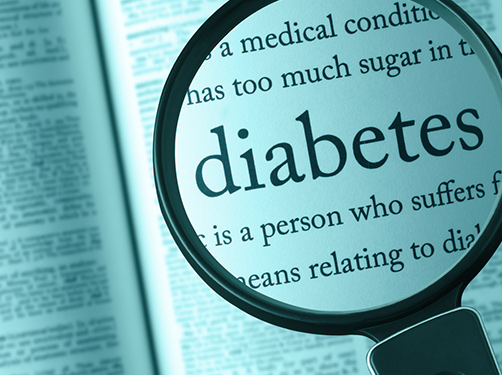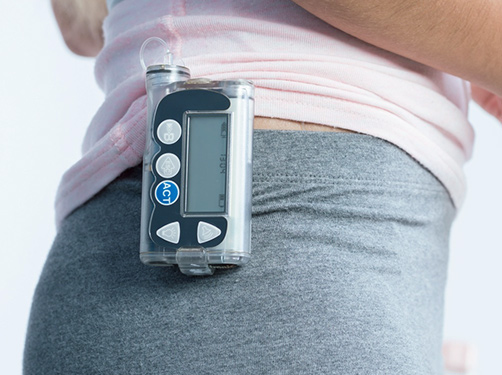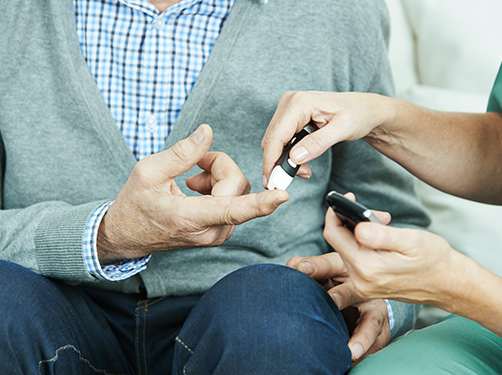Diabetes and Ramadan
Scientific support: Dr. Theresia Sarabhai
Ramadan is the 9th month of the Islamic lunar calendar and the month of fasting for Muslims. It lasts 29 or 30 days and falls in a different period every year. During this time, devout Muslims fast between sunrise and sunset. In other words, they do not eat or drink during the day.
This shifted rhythm of eating habits can lead to health problems in people with diabetes. Although Muslims with diabetes are not required to fast, many believers wish to participate in Ramadan despite their chronic illness.

Contents
- Is fasting recommended for people with diabetes?
- What should people with diabetes keep in mind when fasting?
- When should fasting be interrupted?
- Should pregnant women with diabetes or gestational diabetes fast?
- Why is a healthy diet important even during Ramadan?
- What effects can fasting have on the body?
1. Is fasting recommended for people with diabetes?
Fasting during Ramadan is one of the 5 pillars of Islam. From the beginning of puberty, Muslims can decide for themselves whether they want to fast during this time. This also applies to Muslims with diabetes.
However, it is important for them to decide upon fasting individually in consultation with their attending physician. That way, severe blood sugar anomalies can be avoided and affected persons can learn how to assess their own risk for the further course of the disease. Both the type of diabetes as well as the medical treatment and possible concomitant and secondary diseases have an influence on the health risk during the fasting period.
Good to know:
For people suffering from a chronic disease, such as diabetes, fasting can be a health risk. If they still want to fast, this should be done after medical consultation.
Depending on the risk, a distinction can be made between 3 groups of people:
- Group 1: There is a very high risk in persons with
- poorly controlled type 1 diabetes;
- severely low blood sugar levels during the last 3 months before Ramadan;
- diabetic ketoacidosis during the last 3 months before Ramadan;
- severely high blood sugar levels with hyperosmolar coma during the last 3 months before Ramadan;
- repeated low blood sugar levels in the past;
- impaired awareness of low blood sugar levels;
- an acute illness;
- gestational diabetes or pregnancy with existing diabetes, which is treated with insulin or sulfonylureas;
- advanced cardiovascular disease;
- chronic kidney disease of stage 4 or 5 or requiring dialysis;
- old age and poor health.
- Group 2: There is a high risk in persons with
- poorly controlled type 2 diabetes;
- well-controlled insulin-treated type 2 diabetes;
- well-controlled type 1 diabetes;
- gestational diabetes or pregnancy with existing type 2 diabetes which is treated by basic therapy or metformin;
- chronic kidney disease (stage 3);
- cardiovascular disease;
- other chronic diseases;
- diabetics who work hard physically.
- Group 3: There is a moderate to low risk in persons with well-controlled type 2 diabetes which is treated as follows:
- Basic therapy (nutrition and exercise)
- Oral antidiabetics;
- Metformin
- Alpha-glucosidase inhibitors
- Glitazones
- GLP-1 receptor agonists and DPP-4 inhibitors
- SGLT-2 inhibitors
- Basal insulin
From a medical point of view, people at very high or high risk (groups 1 and 2) should not fast. If they nevertheless decide to fast, intensive care and training should be provided by the attending physician. In addition, their blood sugar levels should be checked regularly and, if necessary, the medical treatment be adjusted.
2. What should people with diabetes keep in mind when fasting?
The month of fasting provokes some changes that must be taken into account in diabetes therapy. Therefore, in preparation for fasting during Ramadan, it is essential to talk not only with the imam, the leader of the services in a mosque, but especially with the attending physician. This should be done about 6 to 8 weeks before the fasting period and include the following requirements, which should then be observed during Ramadan:
Risk assessment
For some individuals, fasting can lead to increased health risk. The type of diabetes, the current medical treatment and possible concomitant and secondary diseases, as well as the occupation, have an influence on the health risk during fasting. Above all, the risk of severe hypoglycemia (low blood sugar levels) as well as hyperglycemia (high blood sugar levels) must be assessed. Therefore, it is important to determine the individual risk together with the attending physician before the beginning of the month of fasting. For self-assessment, under the subheading “May people with diabetes fast?”, 3 groups of people are distinguished according to risk.
Regular blood sugar control
The independent measurement of the blood sugar level should be well mastered and also performed regularly during Ramadan (at least 2 times a day; in case of insulin therapy 3 to 4 measurements per day), because the shifted eating rhythm can affect blood sugar. Especially after the often rich evening meals, the blood sugar level should be measured to avoid hyperglycemia.
Nutrition
The change in eating and drinking behavior during Ramadan can have a considerable impact on blood sugar levels. A diet plan that includes healthy alternatives to some common foods, such as eating more vegetables and salads instead of a lot of fried and sweet foods, can help keep blood sugar levels from spiking after meals.
Even after the end of Ramadan, care should be taken not to eat too much food to prevent high blood sugar levels. In addition, following the fasting month, the attending physician should be consulted again. At this time, further diabetes treatment should be discussed and, if necessary, the medical treatment should be readjusted to normal eating habits.
Exercise
Heavy physical exertion should be avoided during fasting due to the increased risk of low blood sugar levels and/or body fluid deficit (dehydration). However, even in this phase, light to moderate exercise, such as walks, is very important and should be done every day.
Change in medication
During Ramadan, hypoglycemia may increase during the day and hyperglycemia during the night. Therefore, it is important to discuss diabetes treatment in advance with the attending physician and, if necessary, adjust the dose, the time of intake or the type of medication. Blood pressure and blood fat levels can also be affected by changes in eating and drinking habits. This should also be taken into account during treatment and discussed with the attending physician.
3. When should fasting be interrupted?
If there are signs of hypoglycemia or hyperglycemia, the blood sugar level must be measured immediately and fasting interrupted if necessary.
In general, all people with diabetes should interrupt fasting when
- the blood sugar level drops below 70 mg/dl (3.9 mmol/l); if it is between 70 to 90 mg/dl (3.9 to 5.0 mmol/l), it should be checked again after one hour;
- the blood sugar level is above 300 mg/dl (16.7 mmol/l);
- symptoms of low or high blood sugar levels, body fluid deficit, or acute illness occur.
(Note: Body fluid deficit may also cause misinterpretation of the blood sugar level by the blood sugar measurement system. Therefore, the limit values must be considered as mandatory.)
4. Should pregnant women with diabetes or gestational diabetes fast?
Low blood sugar levels (hypoglycemia) pose a major health risk for people with diabetes during Ramadan. The health risk is even more significant for pregnant women and their unborn baby. Therefore, pregnant women with existing diabetes or with gestational diabetes are advised not to fast. In case of gestational diabetes, affected women can fast after weaning if they so desire – but only after having talked to their attending physician.
5. Why is a healthy diet important even during Ramadan?

The 2 to 3 meals per day during Ramadan may tempt you to eat large amounts of food in a short period of time. In this context, particularly high-energy foods with lots of unhealthy fats and free sugars can have a negative effect on the blood sugar level of a person with diabetes. Severely high blood sugar levels can be the result. Therefore, a healthy and balanced diet should also be aimed at during the fasting period. In the morning (suhur), complex carbohydrates and many dietary fibers as found in whole grain products or legumes, should be ingested. In the evening (iftar), low-fat meals are recommended. These include, for example, vegetables, fruit, lettuce or white meat.
Besides eating, drinking between sunset and sunrise is very important. Water and unsweetened teas are particularly suitable.
6. What effects can fasting have on the body?
During Ramadan, the whole daily routine changes, including the rhythm of sleeping and eating. Food choices can also change and have unfamiliar effects on blood sugar levels.
Fasting may entail the following negative risks:
- Low blood sugar levels (hypoglycemia)
- High blood sugar levels (hyperglycemia) and diabetic ketoacidosis
- High blood pressure (hypertension)
- Low blood pressure (hypotension)
- Deterioration of blood fat levels
- Blood clots (thromboses)
- Body fluid deficit (dehydration)
However, fasting can also bring about positive effects:
- A better relationship between the attending physician and the patient
- Better diabetes management, through a greater focus on one's own body and the diabetes condition
- Weight loss
- Improved blood fat levels
Sources:
Al-Arouj, M. et al.: Recommendations for Management of Diabetes During Ramadan. In: Diabetes Care, 2005, 28: 2305-2311
International Diabetes Federation et al.: Diabetes and Ramadan: Practical Guidelines. 2021, Brüssel
International Diabetes Federation: Diabetes and Ramadan. (Letzter Abruf: 02.03.2023)
Sat, S. et al.: Diabetes und Migration. In: Diabetologie, 2022, 17: S411-S431
As of: 02.03.2023






